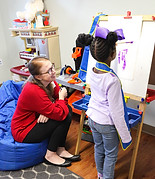Counseling
CARE House therapists provide victims and families of abuse and trauma with scientifically based treatments to create coping and healing with the goal of reducing long-term emotional and social damage.
Parenting Support Made Simple: Triple P (Positive Parenting Program)
Raising kids isn’t easy—and every parent deserves support! The Triple P Program for parents of children ages 0–12 offers practical strategies to help with common parenting challenges such as behavior, routines, and emotional regulation.
What to expect:
-
Just 2–5 short sessions (15–30 minutes each)
-
Flexible format: online or in-person
-
Proven, evidence-based parenting tools you can use right away
-
Support that’s encouraging, practical, and judgment-free
-
Triple P helps parents feel more confident, less stressed, and better equipped to handle the ups and downs of family life. Small changes can make a big difference—for both you and your child!
Trauma-Focused Cognitive Behavioral Therapy (TF-CBT) is an evidence-based treatment that addresses the needs of children with post- traumatic stress disorder (PTSD) and other difficulties related to traumatic life events. The goal of TF-CBT is to provide education to both the child and the caregivers about trauma, symptoms and the specific type of event they experienced. This type of therapy helps them identify and cope with emotions, thoughts and behaviors, through a series of taught coping skills.
The child also experiences gradual exposure, in a safe environment, to the anxiety-
provoking stimuli allowing the child to process the event and move on. Research
has shown TF-CBT to be effective in treating childhood post-traumatic stress
disorder (PTSD) and children who have experienced traumatic events.

Alternatives for Families: A Cognitive-Behavioral Therapy (AF-CBT) is a trauma-informed, evidence-based intervention designed to improve the relationship between children and their caregivers by addressing individual and family problems relating to:
-
Frequent family conflicts
-
Behavior problems, including physical aggression
-
Anger and verbal aggression, including emotional abuse
-
Harsh physical discipline, physical aggression, or child physical abuse
-
Child trauma-related symptoms secondary to any of the above
Any and all of the patterns above may be demonstrated by an individual caregiver or a child/adolescent, but they may also characterize the interactions of the entire family. Accordingly, AF-CBT targets caregiver and child/adolescent characteristics and the larger family context.
Child and Family Traumatic Stress Intervention (CFTSI) is a brief, evidence-based intervention that aims to prevent the development of post-traumatic stress disorder in children and adolescents who were recently exposed to a potentially traumatic event. This intervention works by increasing communication between caregiver and child about the child’s traumatic stress reaction, providing skills to the family to help cope with traumatic stress reactions, and reducing concrete external stressors. This intervention also assesses the child’s needs for longer-term treatment.
Parent-Child Interaction Therapy (PCIT) is an evidence-based treatment for young children with emotional and behavioral disorders that places emphasis on improving the quality of the parent-child relationship and changing parent-child interaction patterns. Children and their caregivers are seen together in PCIT. Most of the session time is spent coaching caregivers in the application of specific therapy skills. Therapists typically coach from an observation room with a one way mirror into the playroom, using a “bug-in-the-ear” system for communicating to the parents as they play with their child, providing real time feedback.

PCIT’s primary use is for young children with behavioral problems, however PCIT’s development also stems from attachment theory, meaning that it can be used to increase attachment between parent and child. Lastly, because PCIT helps parents with difficult children without using corporal punishment, PCIT is a preventative measure for physical abuse. PCIT outcome research has demonstrated statistically and clinically significant improvements in the conduct-disordered behavior of preschool age children; after treatment, children’s behavior is within the normal range. Check out short videos about PCIT : What is PCIT
Problematic Sexual Behavior - Cognitive Behavioral Therapy (PSB-CBT) is an evidence-based treatment for children who act out sexually to addresses Problematic Sexual Behavior (PSB). This school-age model is designed for children ages 7-14 and their caregivers, who receive treatment simultaneously within separate child and caregiver groups. Each group is led by a team of therapists who focus on developing coping skills, impulse control and abuse prevention skills and educating families on sexual behavior rules and effective parenting strategies. As a Cognitive Behavioral Therapy, PSB-CBT requires families to actively participate in weekly sessions and practice skills between sessions. This short-term treatment is approximately 6 months in length and requires that families meet certain completion requirements (in addition to regular attendance) in order to successfully complete treatment.
Research has found PSB-CBT to be incredibly effective in addressing Problematic Sexual Behaviors along with general behavior problems within children, boasting a 98% success rate - meaning that only 2% of children who have successfully completed treatment go on to re-present the behaviors later in life.
To learn more about addressing Problematic Sexual Behaviors, check out our PSB Resource Library.

Women's Empowerment Group & Kids Club is a 10 week strengths approach support group designed to assist women who have experienced intimate partner violence and faced the consequences for themselves and their children. Led by a licensed therapist, this group provides a safe, non-judgmental space to connect with others who have experienced domestic violence.

Women’s Group
-
Reduce distress & increase self-worth
-
Learn safety planning & parenting support
-
Develop discipline strategies & communication techniques
-
Access to community resource information
Kid’s Club
-
Learn to express emotions in a healthy manner
-
Be empowered to share their fears about violence
-
Learn about healthy family relationships
-
Develop healthy conflict resolutions




